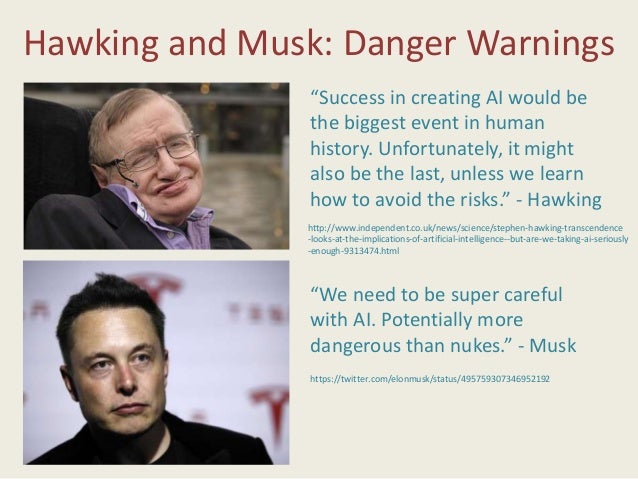 |
| (Via slideshare.net) |
Stephen Hawking: "The development of full artificial intelligence could spell the end of the human race."The concerns about AI appear to be twofold [bold added]:
Elon Musk: "With artificial intelligence, we are summoning the demon."
Bill Gates: "I agree with Elon Musk and some others on this and don’t understand why some people are not concerned.”
many fear that machines will make millions of workers redundant, causing inequality and unrest. Martin Ford, the author of two bestselling books on the dangers of automation, worries that middle-class jobs will vanish, economic mobility will cease and a wealthy plutocracy could “shut itself away in gated communities or in elite cities, perhaps guarded by autonomous military robots and drones”. Others fear that AI poses an existential threat to humanity, because superintelligent computers might not share mankind’s goals and could turn on their creators.Futurists' dreams---or nightmares---of artificial intelligence are close to being realized because of the convergence of three phenomena: the availability of data, the speed of computer processing, and an algorithm ("deep learning") that enables programs to teach themselves.
IMHO, the benefits of artificial intelligence exceed the risks---though the most extreme risk, i.e., human extinction, is fairly negative(!)--but I have faith that we'll come up with answers, just as we have to other concentrations of power like private monopolies (regulated capitalism) and tyranny (democracy, law, and separation of powers).
The most creative solutions will probably have the machines regulate themselves--as private actors do in free markets--though your humble blogger is certainly not smart enough to imagine what these solutions are. The same genius(es) that invented bitcoin, a currency not dependent on central or private banks, can surely come up with a self-regulating structure for artificial intelligence.
If that doesn't work, there's always the "off" button....
No comments:
Post a Comment